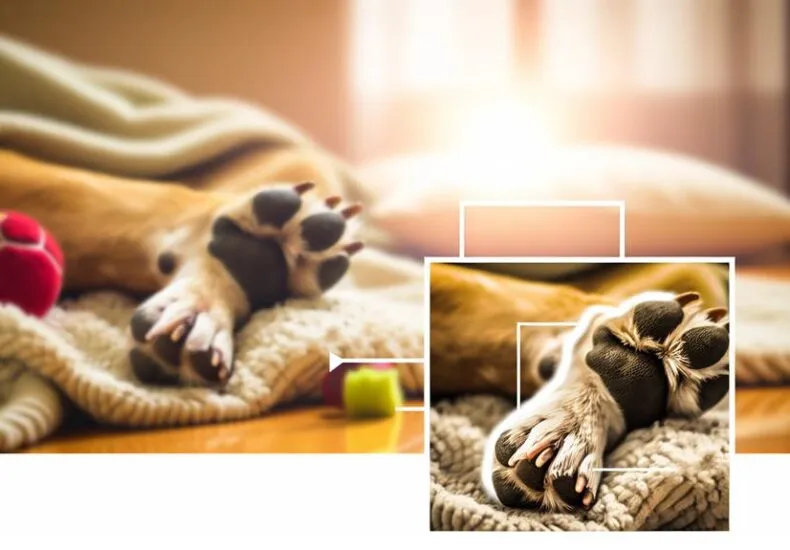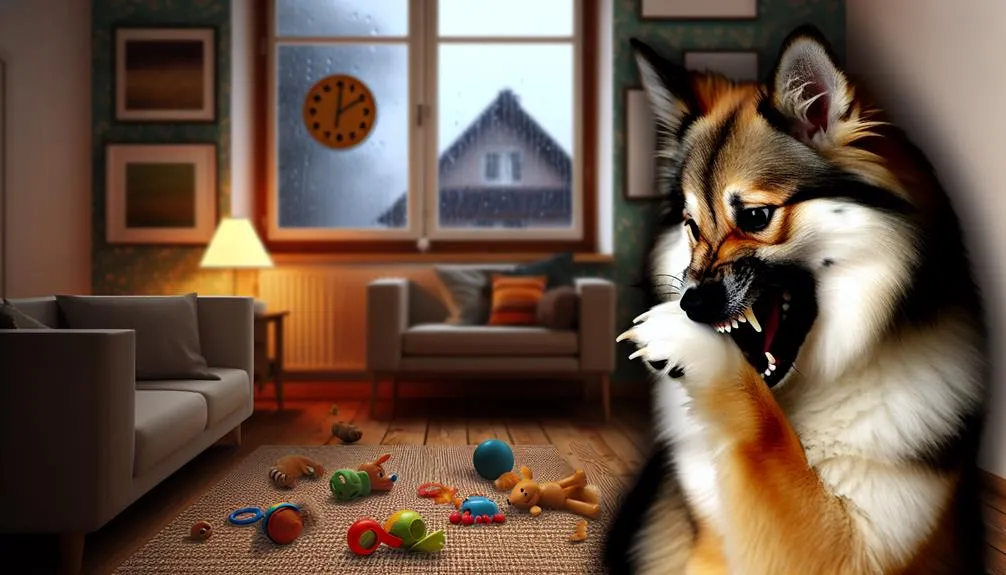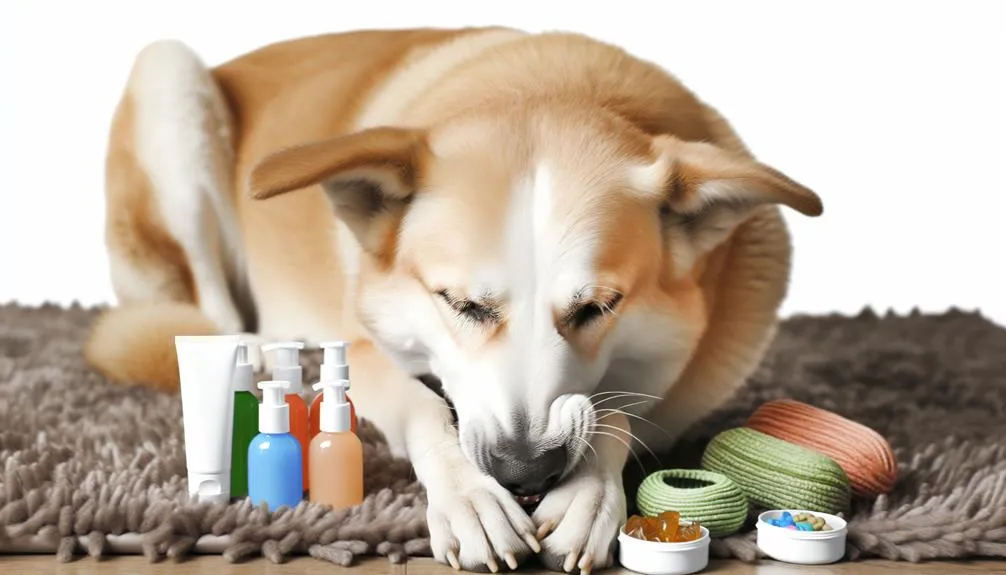
Why Do Dogs Chew Their Paws
You may have noticed your dog spending more time than usual chewing on their paws, and it can leave you wondering why. There are several factors that could be at play, from allergies and sensitivities to behavioral issues like anxiety or boredom. Understanding these reasons is essential not just for your dog's comfort, but also for their overall health. As you consider the possible causes, it's important to explore effective strategies to address this behavior and what it might reveal about your furry friend's well-being.
Common Reasons for Paw Chewing
Many dog owners have noticed their pets occasionally chewing on their paws, and it's a behavior that can stem from various underlying issues. Understanding these common reasons can help you address the behavior effectively. One significant factor is the need for proper paw care. Dogs rely on their paws for mobility and protection, so discomfort or pain can lead them to chew. Regularly inspecting your dog's paws can help identify signs of injury, such as cuts, abrasions, or foreign objects lodged between their toes.
Additionally, environmental factors play an important role in paw chewing. If your dog frequently walks on rough surfaces, they might experience irritation or discomfort. Seasonal changes can also impact their paws; for instance, ice melt chemicals in winter or hot pavement in the summer can cause issues. Ensuring your dog has a safe, comfortable environment can reduce the likelihood of paw chewing.
Moreover, stress or boredom can contribute to this behavior. Dogs may chew on their paws as a way to cope with anxiety or to relieve excess energy. Engaging your dog with regular exercise and mental stimulation can help mitigate this issue.
Allergies and Sensitivities
Allergies and sensitivities can be significant culprits behind your dog's paw chewing habits. Just like humans, dogs can suffer from various allergies that lead to discomfort and irritation. Seasonal allergies, often triggered by pollen, dust, or mold, can cause your dog to experience itchy paws. When they chew at their feet, it's a natural response to relieve that itch. You might notice your dog's chewing becoming more pronounced during specific seasons, which can indicate an allergic reaction.
Food sensitivities can also play a critical role in your dog's paw chewing behavior. Certain ingredients in their diet may not agree with them, resulting in skin irritations or gastrointestinal upset. If your dog is allergic to a common protein, grain, or additive, their body may react by developing itchy skin, leading them to focus their attention on their paws.
To address these issues, it's crucial to consult with your veterinarian. They can help identify potential allergens through tests or dietary trials. Keeping a journal of your dog's behavior and symptoms can also provide valuable insights for your vet. In some cases, simple changes in diet or environment can alleviate your dog's discomfort, reducing their urge to chew. By addressing allergies and sensitivities, you'll not only improve your dog's quality of life but also help them feel more comfortable and at ease.
Behavioral Factors and Anxiety

While allergies and sensitivities can lead to excessive paw chewing, behavioral factors and anxiety often contribute considerably to this habit as well. Many dogs chew their paws as a response to anxiety triggers or simply to relieve boredom. Understanding these factors can help you provide better support for your furry friend.
Here are three common reasons dogs might engage in this behavior:
- Anxiety Triggers: Changes in the environment, loud noises, or separation from you can create stress for your dog. Chewing their paws can serve as a coping mechanism, helping them manage the anxiety they feel.
- Boredom Relief: Dogs need mental and physical stimulation. If they're not getting enough exercise or playtime, they may resort to chewing their paws as a way to entertain themselves. It's similar to how some humans might fidget when they're bored.
- Habit Formation: Once a dog starts chewing out of anxiety or boredom, it can become a habit that's hard to break. This repetitive behavior can provide temporary comfort, creating a cycle that's difficult to disrupt.
Recognizing the underlying causes of your dog's paw chewing is essential. By addressing anxiety triggers and ensuring they have plenty of activities to keep their minds engaged, you can help reduce their need to chew. Providing a stable environment and spending quality time with your dog can make a significant difference in their overall well-being.
Potential Health Issues
When it comes to dogs chewing their paws, it's important to contemplate that this behavior may signal underlying health issues. If your dog's paw chewing seems excessive, it could be a sign of discomfort or pain stemming from various health problems. One common issue is skin irritations, which can arise from allergies, insect bites, or contact with irritating substances. If your dog's paws show redness, swelling, or lesions, it's essential to consult your veterinarian, as these symptoms often indicate a need for medical attention.
Another potential concern is fungal infections. Dogs, particularly those with compromised immune systems or underlying health conditions, can be susceptible to these infections. Yeast infections, for example, may cause intense itching and discomfort, prompting your dog to chew their paws in an attempt to relieve the irritation. If you notice a foul odor or a change in the color of the skin, it's imperative to seek veterinary advice to properly diagnose the issue.
Ignoring persistent paw chewing can lead to more serious complications, such as secondary infections or skin damage. You want to guarantee your furry friend's comfort and well-being. By recognizing these potential health issues, you can take proactive steps to address them. Always trust your instincts; if something feels off, don't hesitate to reach out to your vet. Their expertise can help identify the root cause and guide you in providing the best care for your beloved pet.
How to Manage Paw Chewing

Managing your dog's paw chewing is vital for their overall health and comfort. When your pup starts chewing on their paws, it can indicate underlying issues that need attention. Fortunately, there are effective strategies you can implement to help curb this behavior. Here are three key approaches:
- Preventive Measures: Regular grooming and nail trimming can reduce discomfort caused by debris or overgrown nails. Make sure to keep your dog's paws clean, especially after walks, to eliminate irritants. Additionally, consider using protective booties when walking on rough or potentially harmful surfaces.
- Distraction Techniques: Engage your dog in more physical and mental activities. Offering interactive toys or puzzles can keep their mind occupied and reduce the tendency to chew. Regular playtime and exercise are also essential in alleviating boredom, which often leads to unwanted behaviors.
- Consult a Professional: If your dog's chewing persists despite your efforts, it may be time to consult a veterinarian or a professional dog trainer. They can provide insights into potential medical issues or behavioral concerns, ensuring your dog gets the appropriate care.
Frequently Asked Questions
Can Certain Dog Breeds Chew Their Paws More Than Others?
Certain dog breeds can indeed have a genetic predisposition that influences their behavioral tendencies, making them more prone to chewing their paws. Recognizing these traits can help you better understand and address your dog's needs.
How Can I Tell if My Dog's Paw Chewing Is Serious?
If your dog's paw chewing seems relentless, it could be a sign of serious paw health issues or anxiety triggers. Watch for redness, swelling, or excessive licking, and consult a vet if you're concerned.
Are There Specific Times of Day When Dogs Chew Their Paws More?
You might notice your dog chewing their paws more during specific times, like after walks or during moments of stress. Observing daily routines can help identify chewing triggers, allowing you to address any underlying issues effectively.
Does Paw Chewing Indicate Boredom or Lack of Exercise?
If you notice your dog chewing its paws, it might be a sign of boredom or unmet exercise needs. Addressing these factors can help reduce this behavior, ensuring your furry friend stays happy and healthy.
Can Dog Food Affect Paw Chewing Behavior?
Absolutely, dog food can influence paw chewing. Dietary deficiencies or food allergies might cause discomfort, leading your dog to chew. It's crucial to monitor their diet and consult a vet if you notice unusual behavior.
Conclusion
Understanding why your dog chews their paws is like peeling back layers of an onion; each layer reveals a potential cause that needs attention. Whether it's allergies, anxiety, or health concerns, addressing the root of the issue is essential for your furry friend's well-being. By being proactive and observant, you can help keep their paws healthy and free from discomfort. If you notice persistent chewing, don't hesitate to consult a veterinarian to guarantee your dog gets the care they need.
You may also like
Archives
Calendar
| M | T | W | T | F | S | S |
|---|---|---|---|---|---|---|
| 1 | 2 | 3 | 4 | 5 | 6 | |
| 7 | 8 | 9 | 10 | 11 | 12 | 13 |
| 14 | 15 | 16 | 17 | 18 | 19 | 20 |
| 21 | 22 | 23 | 24 | 25 | 26 | 27 |
| 28 | 29 | 30 | ||||
Leave a Reply